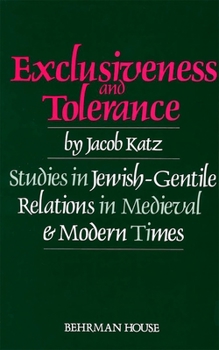Exclusiveness and Tolerance
Select Format
Select Condition 
Book Overview
A study of Jewish-Christian relations from medieval times through the eighteenth century. Both Jewish and Christian writers are represented. This description may be from another edition of this product.
Format:Paperback
Language:English
ISBN:0874413656
ISBN13:9780874413656
Release Date:January 1982
Publisher:Behrman House Publishing
Length:1 Pages
Weight:0.10 lbs.
Dimensions:0.5" x 8.2" x 5.4"
Customer Reviews
2 ratings
How Jews came to tolerate Christians
Published by Thriftbooks.com User , 16 years ago
When thinking about interfaith relations in Europe in the Middle Ages, we almost always think about Christians not tolerating Jews. There is no doubt that medieval Christians didn't like Jews much and persecuted them. What's not often discussed is that medieval Jews didn't like Christians either. However, by the early 1800s, Jews tolerated Christians, and in some cases, they really liked them and emulated them. In this slender but dense book, Jacob Katz explains why. He begins by sketching out what Jewish law has to say about relations with non-Jews. (It was against such relations.) Not having anything to do with idolaters was fine in ancient Babylonia or ancient Palestine, where there were so many Jews, but it wasn't practical in medieval Europe, where the Jews were a small minority. So, Jewish legal scholars had to completely reinterpret the law on this point. Plus, when Christians confronted Jews with their anti-Christian theology (at disputations), the Jews had to come up with explanations for why many Talmudic concepts did not apply in medieval Europe. (I won't give away what they said.) Soon, the Jews began to believe their own rationalizations and actually did become more tolerant of Christians. Early modern ghettoization was accepted or even embraced by Jews, as it gave them their own space and reduced overt competition with Christian neighbors. Eventually, universalistic Enlightenment ideas influenced Jewish thinkers and Jewish thought on who would be "saved." The end result: more toleration and even overt acceptance of Christians and Christianity. This book is an intellectual tour-de-force, but I give it 4 stars rather than 5 because it is not an easy read for someone unfamiliar with Jewish theology and history of religion. Most readers will find themselves looking up a lot of terms, from Aggadah to Zohar.
Engaging and illuminating
Published by Thriftbooks.com User , 18 years ago
Before reading this book, I'd had a much more black-and-white (sc., mostly black) impression of Jewish life in medieval and early modern Europe. This cogently-writtten volume presents a much more nuanced picture. Ghetto walls were an injustice, but also a refuge for many Jews from the tense environment around them. Oddly enough, this circumstance contributed to the relatively large number of conversions to Christianity in the liberal West after the Napoleonic liberations (in contrast to the shtetl Jews in Poland and Russia, who lived side-by-side with Gentile neighbors). Katz's discussions of of Jewish martyrs during the First Crusade and the flexibility of rabbinic responsa, among other topics, are also quite fascinating.





